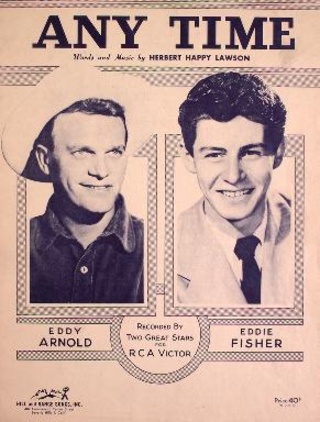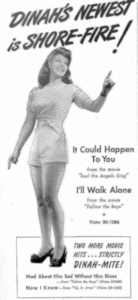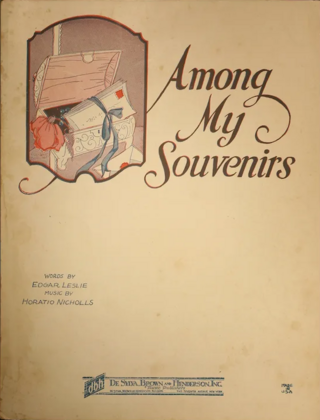Related Research Articles

"To Each His Own" is a popular song with music written by Jay Livingston and lyrics by Ray Evans. It is the title song of the movie of the same name and was published in 1946 by Paramount Music. The duo were assigned to write this song after film composer Victor Young turned it down.

"Any Time" is a Tin Pan Alley song written by Herbert "Happy" Lawson. The song was published in 1921 and first recorded by Emmett Miller for OKeh Records in 1924, accompanying himself on ukulele, Lawson recorded his own version for Gennett Records on July 31, 1925. It became associated with Country music when Eddy Arnold rescued it from obscurity in 1948, topping the Billboard Juke Box Folk Records Chart for nine weeks.

"I'll Walk Alone" is a 1944 popular song with music by Jule Styne and lyrics by Sammy Cahn. The song was written for the 1944 musical film Follow the Boys, in which it was sung by Dinah Shore, and was nominated for the Academy Award for Best Original Song but lost to “Swinging on a Star”. Shore recorded the song in March as a single, which became her first #1 hit on the Billboard charts.
"Someday You'll Want Me to Want You" is a popular song published in 1944 by Jimmie Hodges. The song became a standard, recorded by many pop and country music singers.
"You Gave Me a Mountain" is a song written by country singer-songwriter Marty Robbins during the 1960s. It has been recorded by many artists, including Robbins himself, but the highest-charting version of the song was by Frankie Laine in 1969. This version was included on Laine's album of the same name.
"I'll Hold You in My Heart (Till I Can Hold You in My Arms)" is a 1947 song by Eddy Arnold. The song was Eddy Arnold's third number one on the Billboard Juke Box Folk Records chart. "I'll Hold You in My Heart (Till I Can Hold You in My Arms)" spent 46 weeks on the chart and 21 weeks at number one. The song also served as Arnold's first crossover hit, peaking at number 22 on the Billboard Best Sellers in Stores chart.
"Bouquet of Roses" is a 1948 song written by Steve Nelson (music) and Bob Hilliard (lyrics). It was originally recorded by Eddy Arnold and his Tennessee Plow Boys and his Guitar in Chicago on May 18, 1947. It was released by RCA Victor as catalogue number 20-2806 and by EMI on the His Master's Voice label as catalogue numbers BD 1234 and IM 1399. "Bouquet of Roses" was Eddy Arnold's third number one in a row on the Juke Box Folk Record chart and spent 19 weeks on the Best Selling Folk Records chart. In 1949, when RCA Victor introduced its new 45 RPM single format this record was among seven initial releases and the first in the Country and Western category. Arnold would re-record "Bouquet of Roses" several times during his career.

"Texarkana Baby" is a song written by Fred Rose and Cottonseed Clark.
"Just a Little Lovin' (Will Go a Long Way)" is a 1948 song written by Eddy Arnold and Zeke Clements. Eddy Arnold's recording of the song was his fifth number one in a row on the Folk Records chart, spending four non consecutive weeks on the Best Seller chart with a peak position of No. 13.
"A Heart Full of Love (For a Handful of Kisses)" is a 1948 single by Eddy Arnold.

"Don't Rob Another Man's Castle" is a song written by Jenny Lou Carson. First recorded by Eddy Arnold on December 21, 1948 at RCA Victor Studio 1 at 155 East 24th St. in New York City, the song reached No. 1 on the Billboard Folk Best Seller chart in 1949.

" I'm Throwing Rice (At The Girl That I Love)" is a 1949 hit written by Eddy Arnold, Steve Nelson and Ed Nelson, Jr. and first performed by Eddy Arnold. The Eddy Arnold version went to number one on the Country & Western Best Seller Lists for four weeks.

"Among My Souvenirs" is a 1927 song with words by Edgar Leslie and music by Horatio Nicholls.
"What Is Life Without Love" is a 1947 song by Eddy Arnold. The song was Arnold's first number one on the country chart in the US, spending one week at the top and a total of twenty-two weeks on the chart.
"The Cattle Call" is a song written and recorded in 1934 by American songwriter and musician Tex Owens. The melody was adapted from Bruno Rudzinksi's 1928 recording "Pawel Walc". It later became a signature song for Eddy Arnold. Members of the Western Writers of America chose it as one of the Top 100 Western songs of all time.
"I Walk Alone" is a song written by Herbert Wilson. and recorded by American country music artist, Eddy Arnold and was the B-side of his 78 rpm single "Did You See My Daddy Over There" (1945), and later for his compilation album Eddy Arnold Sings Them Again (1960).
"One Kiss Too Many" is a song written by Eddy Arnold, Steve Nelson and Ed Nelson Jr. The song was first performed by Arnold and reached number one on the Most-Played Juke Box Folk Records chart in 1949, spending three non-consecutive weeks in the top spot. It was one of five number ones which Arnold achieved on the Juke Box Folk chart during 1949.

"That's How Much I Love You" is a country music song written by Arnold, Fowler, and Hall, sung by Eddy Arnold, and released in 1946 on the RCA Victor label. In October 1946, it reached No. 2 on the Billboard folk chart. It was also ranked as the No. 10 record on the Billboard 1946 year-end folk juke box chart.

"The Echo of Your Footsteps" is a country music song written by Jenny Lou Carson and sung by Eddy Arnold, billed as "Eddy Arnold, The Tennessee Plowboy and His Guitar". It was released in 1949 on the RCA Victor label. The "B" side was "One Kiss Too Many".
References
- 1 2 Library of Congress. Copyright Office. (1946). Catalog of Copyright Entries 1946 Musical Compositions Renewals New Series Vol 41 Pt 3. United States Copyright Office. U.S. Govt. Print. Off.
- ↑ "Victor 20-2241 (10-in. double-faced)". Discography of American Historical Recordings. Retrieved 2023-07-29.
- 1 2 "Victor matrix D6VB-2893. It's a sin / Eddy Arnold". Discography of American Historical Recordings. Retrieved 2023-07-29.
- ↑ Whitburn, Joel (2004). The Billboard Book Of Top 40 Country Hits: 1944-2006, Second edition. Record Research. p. 29.
- ↑ "Marty Robbins singles". Allmusic . Retrieved 30 March 2011.